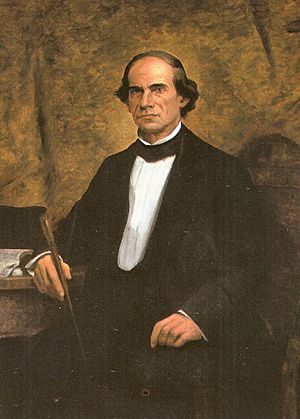Fermín Toro facts for kids
Quick facts for kids
Fermín del Toro y Blanco
|
|
|---|---|

Portrait by Antonio Herrera Toro
|
|
| Minister of Foreign Affairs of Venezuela | |
| In office 14 April 1858 – 17 June 1859 |
|
| President | Julián Castro |
| Preceded by | Wenceslao Urrutia |
| Succeeded by | Miguel Herrera |
| Personal details | |
| Born | 14 July 1806 Caracas, Venezuela |
| Died | 23 December 1865 (aged 59) Caracas, Venezuela |
| Spouse | María de las Mercedes de Tovar y Rodríguez del Toro |
| Profession | Writer, novelist, politician, diplomat |
| Signature |  |
Fermín Toro y Blanco (born in Caracas, El Valle, on July 14, 1806 – died in Caracas on December 23, 1865) was a very important Venezuelan thinker, politician, diplomat, and writer. He played a big role in Venezuela's history.
Contents
Biography of Fermín Toro
Fermín Toro had a busy public life. He served as the Minister of Foreign Affairs and was the Minister of Finance twice, in 1847 and 1858. He also led the National Convention of 1858 and was the President of the Chamber of Deputies.
He worked as a special representative for Venezuela in other countries like the United Kingdom, Spain, France, and Colombia. He even ran for president more than once.
A major achievement was when he signed a treaty with Queen Isabel II of Spain in 1846. This treaty officially recognized Venezuela's independence from Spain, which used to be its colonial ruler. After this, the Queen even held a special party in his honor! He also helped work out country borders with Colombia and discussed important political matters with European leaders.
Fermín Toro's Writings and Speeches
Fermín Toro is also remembered for his amazing writings and his skill as a speaker. He wrote the very first novel in Venezuela. However, he is even more famous for his essays about money and politics. His essays were so good that even the famous writer Leo Tolstoy mentioned him in his book Resurrection.
Besides politics and writing, Fermín Toro was also interested in languages (philology) and plants (botany). Many people believe he was the best speaker in Venezuela's history when it came to parliamentary debates.
He is seen as a symbol of strong moral character. For example, he stood up against President Jose Tadeo Monagas when the president ordered an attack on Congress on January 24, 1848. Fermín Toro showed that it's important to stand up for what's right, even against powerful leaders.
Death and Lasting Impact
Fermín Toro's remains were moved to the Panteón Nacional (National Pantheon) on April 23, 1876. This is a special place where important Venezuelan heroes are buried.
Many universities and schools have been named after him to honor his memory. One of the most famous is the Liceo Fermín Toro, which is Venezuela's largest and most respected public school. Several books have been written about his life.
In Caracas, one of the main streets is named after him. You can also find a statue of him at the entrance of the Liceo Fermín Toro. The Venezuelan National Congress building has four special squares, and one of them is named after him, celebrating his contributions as a parliamentarian.
Fermín Toro's Family Background
Fermín Toro came from an important family in Caracas, known as the Marquess del Toro. His great-grandfather, Francisco Rodríguez del Toro e Isturiz, was a colonial Governor and Captain General of Venezuela.
He was also closely related to other key figures in Venezuela's fight for independence, like Francisco Rodríguez del Toro and Fernando Rodríguez del Toro. He was also related to María Teresa Rodríguez del Toro y Alaysa, who was the wife of the famous leader Simón Bolívar.
Fermín Toro's Published Works
Fermín Toro wrote many important pieces. Here are some of his well-known publications:
- Essays
- Reflexiones sobre la Ley del 10 de abril de 1834 (Reflections on the Law of April 10, 1834)
- Los estudios filosóficos en Venezuela, Europa y América (Philosophical Studies in Venezuela, Europe, and America)
- Cuestión de imprenta (Matter of the Press)
- Descripción de los honores fúnebres consagrados a los restos del Libertador Simón Bolívar (1842) (Description of the Funeral Honors for the Remains of Liberator Simón Bolívar)
- Discurso ante la Convención de Valencia (1858) (Speech before the Valencia Convention)
- Ensayo gramatical sobre el idioma guajiro (Grammatical Essay on the Guajiro Language), a manuscript put together by Adolf Ernst in 1872.
- Novels
- Los Mártires (1842) (The Martyrs)
- La Viuda de Corinto (1837) (The Widow of Corinth)
- La Sibila de los Andes (The Sibyl of the Andes)
Places Named After Fermín Toro
Many institutions have been named in honor of Fermín Toro:
- Universidad Fermín Toro, located in Barquisimeto ([1])
- Colegio Universitario Fermín Toro, also in Barquisimeto ([2])
- Liceo Fermín Toro, in Caracas (Liceo Fermín Toro)
- Instituto de Estudios Parliamentarios Fermín Toro (Institute of Parliamentary Studies Fermín Toro)
See also
 In Spanish: Fermín Toro para niños
In Spanish: Fermín Toro para niños
 | Anna J. Cooper |
 | Mary McLeod Bethune |
 | Lillie Mae Bradford |

